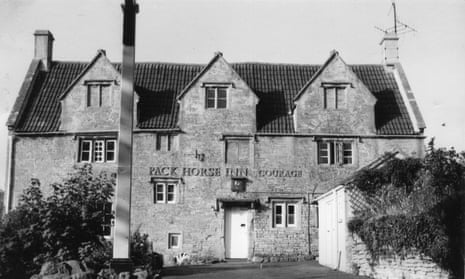The Packhorse in the village of South Stoke, just south of Bath, was never a smart pub but it was friendly, welcoming and earthy, beloved of locals and visitors alike.
It was the sort of place that didn’t frown if you kept your boots on after a muddy walk along the route of the old Somerset coal canal. Food options tended to be limited to cheese-and-onion rolls and bags of crisps, but that was a charm rather than a flaw. The regulars would always shuffle over to give you a share of the fire on chilly days.
My son Tom and his mate Fergal ordered their first pints of cider there (they were turned down as they were only seven – but in the sort of kind and good-natured way that you don’t forget).
But in 2012 the pub was shut and, like so many, earmarked for housing. “It was a terrible blow,” said villager Jenny John. “Our sense of community suffered. There’s a church and village hall but not everyone goes to those. The Packhorse was the only place where everyone went, where you got to meet your neighbours regularly. The loss to the village was huge.”
This is not an unusual picture. The Campaign for Real Ale said this weekend that 18 British pubs are closing every week. It argued that pubs are being hit by a triple whammy of one of the highest rates of beer duty in Europe, rapidly rising business rates and hefty VAT. A third of the cost of a pub pint is now made up of various taxes, it said.
What is more unusual about South Stoke and the Packhorse is that the villagers weren’t having it. They fought back. Determined to hang on to a vital community resource, they hatched an action plan to save it. Over the last six years, 450 shareholders have clubbed together to put in more than £1m to buy and refurbish the pub. “It evolved into the biggest community pub buy-back project in British history,” said Dom Moorhouse, project lead of the Save the Packhorse team. “I think people got stuck in because they wanted to save a beautiful old building, but also because they did not want to lose a place of social connection.”
Moorhouse said it was about much more than raising money. People – from accountants to lawyers, from gardeners to craftspeople – donated their skills and time. Some hidden treasures were uncovered, including a 17th-century fireplace. The team appealed for help in restoring it, and an expert from France popped over to lend a hand.

The project also encouraged local historians to look into the pub’s past. It had been assumed that it opened in 1674 – the date above the door – but samples taken from the oldest beams in the building and dendrochronology tests (tree-ring dating) put the date at 1618.
Brian Perkins doesn’t go quite that far back, but his 87 years are intimately entwined with the pub. His grandparents, Frederick and Emily Rose, ran it when he was born in the room above the bar in 1930. As a boy he did odd jobs such as polishing the floors, cleaning windows and serving the suppers – hunks of bread and cheese with tomatoes grown in the greenhouse, or tripe on special occasions.
Perkins and his wife, Edith, will cut the ribbon to reopen the pub on Sunday. “It was a such a shame when the pub closed,” he said. “It’s meant so much for so many people, including me. The project has brought so many memories back for us all.”
Times do change. The refurbishment has included inside toilets and a modern kitchen. Many pubs now struggle to survive serving only beer, rolls and crisps, so the menu will include dishes such as salt cod croquettes and Portland crab. But the vision is clear – to “re-establish the Packhorse pub as a community-owned, commercially viable, social amenity that we can all enjoy and be proud of”. The idea is not to offer “earnest, formal, high service” but to put a smile on visitors’ faces.
Moorhouse said he hoped the Packhorse would inspire others. “We’ve proved to local communities across the country what is possible and we’d love to see similar successes elsewhere. It’s been hard work but worth the effort. It’s brought together so many people across the generations.”
The loss of the Packhorse threatened to weaken a village community; the very act of restoration has made it stronger.

